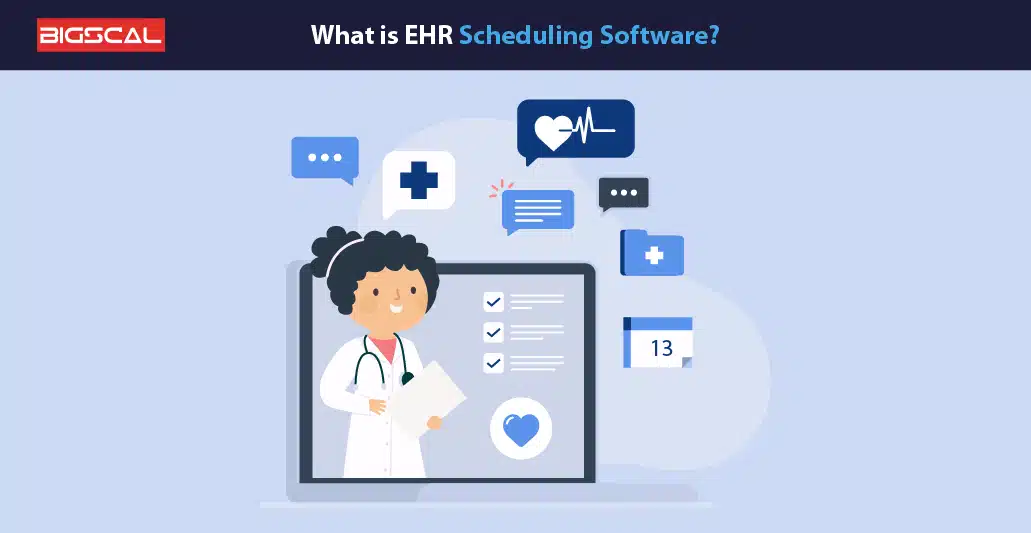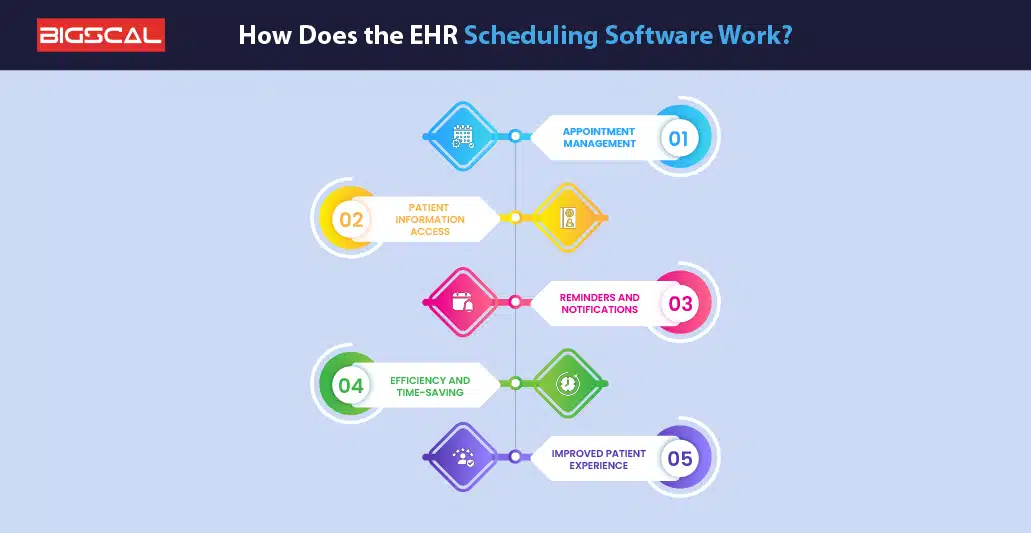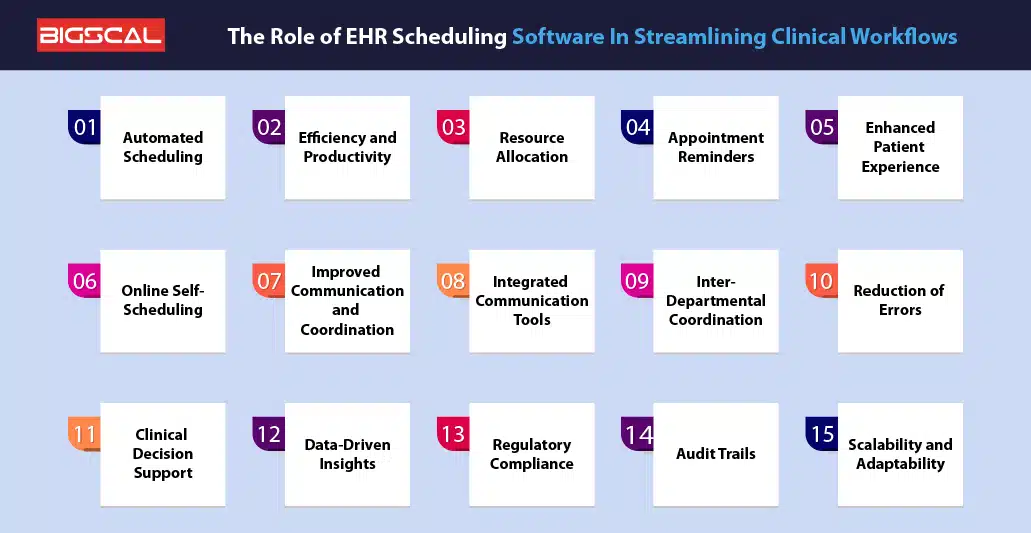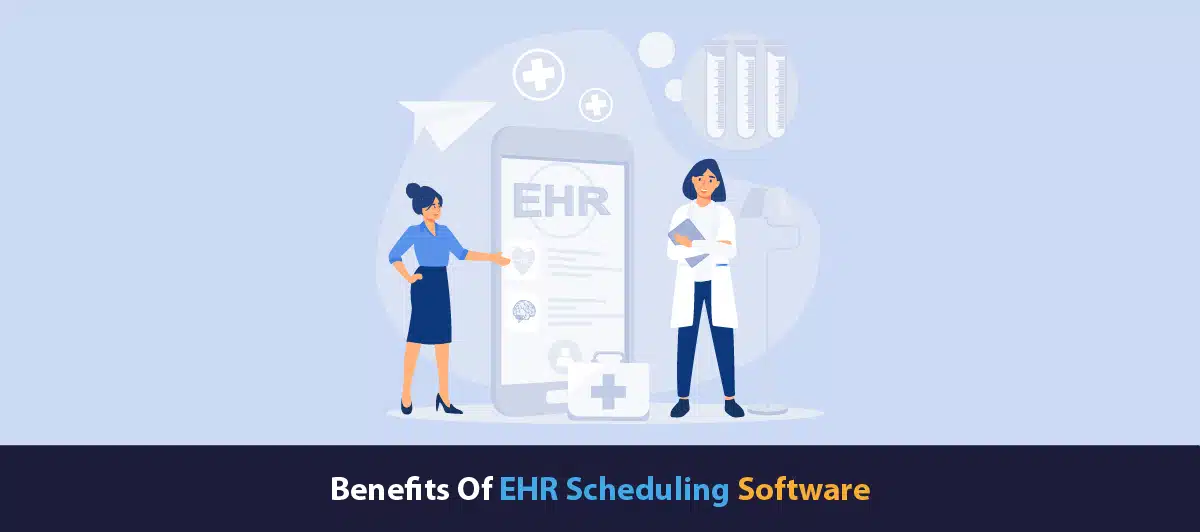How EHR Scheduling Software Streamlines Clinical Workflow?
Quick Summary: EHR Scheduling software is creating a drastic change by streamlining clinical workflows. But how? It provides solutions to a number of settings by automating appointment scheduling, decreasing appointment-related administrative work, and minimizing appointments errors. It helps in efficient patient care delivery. There are a lot more benefits that Keep reading to understand all!
Introduction
Augmenting the fact that modern healthcare practice is popular by efficiency, efficiency has become an imperative goal in Health care practice. The EHR scheduling software is revolutionizing in clinics and hospitals handling clinical practices. It helps to enhance hospital practices by making them less complex.
This is not the era anymore of flitting around paper calendars and keeping records manually while focusing on the patients. The medical software for scheduling can efficiently manage these responsibilities. It minimizes the chances of errors and takes much of the burden off the administration and doctors’ time.
Integrated appointment scheduling, check-in, and follow-up tools can improve communication, patient attendance rate, and use of resources in clinics. Furthermore, this software sometimes includes tools such as automated notifications, appointment portals that have easy access by patients.
Let’s read more and understand how EHR software streamlines medical practices!
What is EHR Scheduling Software?

EHR scheduling software is a technology tool that healthcare providers. They can use to schedule and thus organize patient schedules. It is a type of practice management software. EHR Software means Electronic Health Records; these are digital records of patients’ medical data. Integrating scheduling with EHR is a feature where the software used to book appointments also has links to the patient’s electronic record.
In addition, this software may contain making options such as automated notifications, patients’ portal and real-time update, which may have additional benefits of enhancing the patients’ satisfaction and contributing to organizational and efficient clinical practice.
The benefit is to achieve efficiency at this stage of development and provide patients with more comprehensive care from healthcare facilities without focusing on paperwork during their treatment process. In this particular blog, we shall examine the benefits of EHR scheduling software in enhancement of clinical processes within healthcare facilities, and the subsequent improvement of patient outcomes.
How Does the EHR Scheduling Software Work?
Here’s how these software work:

Appointment Management
It provides enhanced ability for the staff to schedule their appointments, reschedule them and even cancel them. This minimizes cases of having back to back bookings in a single day and assists in upholding a neat schedule.
Patient Information Access
As it is integrated with EHR, doctors and staff can easily get patients’ records. Which aids in giving more effective and individualized treatment.
Reminders and Notifications
It can also notify patients about their appointments through text messages, emails or calls since patients cannot fail to honor the appointment as planned.
Efficiency and Time-Saving
The influence of bringing about automation in many areas of working. It reduces time for general paperwork and this gives healthcare providers more time on attending to the patients.
Improved Patient Experience
Patients can choose their own convenient time and date to book. The appointment and receive timely reminder notifications that improve their sentiments about the healthcare facility.
The Role of EHR Scheduling Software In Streamlining Clinical Workflow
Here are some ways in which the EHR software help doctors to streamline workflow:

Automated Scheduling
Appointment scheduling software entails the use of technology to ease the process of making appointments between providers and the patients. It saves time and effort then manual scheduling. As manual scheduling where patients can book for an appointment, cancel them or reschedule on an alternative date themselves. This system ensures efficiency in scheduling. Whereby there are no free slots or times when all slots have been booked by different clients.
Automated scheduling particularly benefits for healthcare providers. With it, the planned schedule is quickly and clearly legible, which makes it easier to navigate through the day. There is an opportunity to set the system to send reminder messages to a patient. It promote better attendance to scheduled appointments and high satisfaction rates. It means that through automation of these everyday tasks of scheduling. Nursing personnel is able to observe more productivity on its work and therefore devote more time to patients. Thereby, providing for an efficient health care organization delivery.
Efficiency and Productivity
EHR scheduling software enhances medical setup effectiveness and efficiency for administrative tasks it tracks each day’s schedule. Through the automation of appointment booking, it eliminates the number of time spent by the staff in making the appointment. Hence, freeing their time to attend to the patients. The software is able to easily map patients’ requirements with the available doctors or specialists. Thereby, properly and effectively schedule appointments.
Updates on the patient information and quick access to the patient information. This info allows the healthcare providers to plan on every appointment. Therefore, it reduces time spent by the patients resulting in improvement of patient experience. Moreover, it has reporting and analytical capabilities as its regular features. These features can assess the daily work and improve the schedules. In the broad sense, EHR scheduling software allows for decreased traffic and increased efficiency in clinical centers. Thus, it provides the best outcomes for both patients and healthcare workers assigned for their treatment.
Resource Allocation
EHR patient scheduling software can be the key to efficient resource allocation within a healthcare facility. Thus, it offers a more complete view of the scheduling allows for better distribution of rooms, equipment, and manpower. It can forecast congestion density and allocate necessary resources such as personnel and machinery to the patient traffic-flow. This also assists in organizing the availability of the healthcare providers. In such a way that there is no overbooking and development of work fatigue.
This efficient use of resources is also beneficial to patients and hospital staff. In addition, it aids in cost cutting by avoiding unnecessary resource expenditure and guaranteeing the optimum utilization of equipment.
Appointment Reminders
By using the medical office scheduling software, patients can receive alerts for appointment reminders through text messages, emails, or phone calls. These reminders assist in minimizing the number of no-shows, which can interfere with the clinic’s schedule and overall productivity. Therefore, clinics would be able to experience a more efficient rate of the number of patients that visits the clinic within the stipulated time.
It also means that time and resources would not be wasted as staff will not have to find ways of covering for large breaks in the calendar. However, the appointment reminders can be made special, and used to include some features. For example, some preparation tips or alterations of an appointment time and place. This allows effective flow of information between the clinic and the patient. It in turn increases the level of satisfaction of the patient.
Enhanced Patient Experience
EHR medical appointment scheduling software enhancing patient experience. It is most effective for the administration of patient appointments as it is part of the effective overall scheduling change. Patients can also get follow-up appointment notifications. It helps in preventing forgetting of their appointments. Also, using this software makes a check-in easier especially when using a clinic where the patient details are already captured on the software.
The patients also like the fact that all their medical information is easily retrievable and readily accessible to the healthcare provider hence enhancing proper care. Furthermore, it can help with scheduling follow-up appointments and additional post-visit instructions. The patient needs to be aware of regarding the ongoing management plan. Moreover, it increases patients’ satisfaction level and strengthens the patient-doctor relationship and enhance workflow within healthcare organizations.
Online Self-Scheduling
Healthcare appointment scheduling software also allows the patients to schedule their appointments through the convenience of pushing buttons as opposed to bettering the clinic. This feature is always on, and patients can schedule a time that is convenient for them excluding regular working hours. It saves time for admin employees, who do not have to take a large number of appointment calls ever since. Patients have an option of viewing the slots available in a given day and choose the right one hence this would minimize on issues of scheduling and their mistakes.
This high level of convenience can be of particularly importance to the patients who have their awkward and hectic schedules. However, online self-scheduling may also encompass options of choice of services or choice of providers. It would again serve to enhance the patient experience.
Improved Communication and Coordination
The EHR scheduling system also plays an important role in improving cooperation in healthcare facilities. This makes work easier because by centralizing a patient’s records and appointment timetable, everyone attending to a certain patient gains a complete understanding of what the patient requires. For instance, through e-Health medical practitioners, nurses, and other administrators in the hospitals are able to receive the same information at the same time.
Hence, eliminating some of the common problems such as misunderstanding and scheduling issues. This makes communication faster and provides real-time updates on patient appointments, making plan and implementation more efficient and less error-prone. When all team members have a clear view of the picture, they can work in unison and guarantee that the patients receive appropriate and coherent care as soon as possible.
Integrated Communication Tools
EHR scheduling tools within patient relationship management. Such feature includes messaging and notifications, which also help to minimize extra steps in the clinical environment. The above tools foster fast and more appropriate contact between a number of healthcare givers making use of technology contrary to time-consuming phone calls or even face to face meetings.
For instance, a doctor can use a mobile application to immediately send a message to a nurse about the patient’s care plan or be notified about changes to appointments or patient’s condition. This instant communication also ensures that decisions are made as soon as possible, patients are tended to as soon as possible, and possible delays are eliminated. Additionally, integrated tools make sure that every communication concerning the patient is recorded on the patient’s record thus creating a record that one can easily refer to when consulting.
Inter-Departmental Coordination
EHR scheduling software also features other subtypes that help in the co ordination of various departments in a medical facility. For instance, if a patient is required to see an expert after the first meeting, the scheduling software can schedule that meeting with ease and share the patient’s information with the specialist’s unit.
This smooth transfer of information between providers minimizes delays and thus promotes patient care. It also enables effective management of limited resources for instance x-ray machines, operating theaters or any other resource commonly used by different specialties. Each department is able to see the schedule and availability of the others and ensure that there are not two events at the same time in the facility. Thus, EHR scheduling application improves the general organization of the healthcare system as it plays a part of the coordination with all departments.
Reduction of Errors
Another advantage of EHR scheduling software is having a lesser chance of making mistakes. In manual scheduling methods, it is very easy to make some errors like; Double booking, missed appointment, or wrong details of the patient. But with EHR scheduling system medical clinics can reduce these errors. As it automating data input and also updating continuously in real time style. It informs the staff members about discrepancies and assures that patient records are well-maintained and recent. It assure that patient and doctors does not missed appointment.
This level of precision is important especially in the health sector since any slight mistake may lead to devastating outcomes in healthcare industry. EHR scheduling software minimizes the errors, it end up increase patient safety, and the quality.
Clinical Decision Support
Clinical decision support aids that assist in providing the right information in EHR scheduling software software. These are like patient portal and they can prompt the user about recommended precautions. Furthermore, they can warn the user about incompatible substances, and recommend therapies that are compatible with the user’s current state of health. They can up to date with up-to-date information about standard medical practices with services online.
With the current link between CDS and the schedule, the software will be able to prompt providers regarding any subsequent follow-ups and screening during appointments. This support system justify that it aids in achieving comprehensive and timely care committing to best practices and evidence based medicine.
Data-Driven Insights
EHR scheduling application captures a significant volume of information and can provide critical insights for enhancing clinical processes. This is possible through analyzing appointment schedules, the number of patients who fail to show up for their appointments, and records of their treatment. For example, if many patients failed to honor their appointments based on some time of the year, the facility can then vary their schedule to account for the occurrence.
It also has the capability of making reports on patient’s demographics and health and can also assist in decision making especially in resource allocation and planning. Thus, these results help healthcare facilities to find ways of working more effectively, managing patients more effectively, and making better decisions that ultimately improve the quality of service delivery.
Regulatory Compliance
In healthcare settings, regulatory compliance entails adherence to policies and standards aimed at protecting patient welfare and their information. There is also software scheduling which has complied to these standards to ensure clinics do not have challenges with compliance.
For instance, the software makes sure it protects patient data. Additionally, it assures only patients, nurses, doctors, and other relevant personnel should access the information. It also assists in keeping good records of the patients and the treatments. This is especially helpful in case of audits and inspection. This way clinics can save themselves from penalties for non-compliance and legal problems that may arise.
Audit Trails
Audit trails refer to the records of events that occurred in the system including who performed the action, the action, and when it was done. In regard to EHR scheduling software, audit trails assist with capturing all activities involving scheduling patients and managing data access. They are invaluable in security and enforcement of accountability.
In a case of a data leak or an error, the audit trail would reveal how the incident occurred and possibly minimize similar incidences. It also assists in meeting the regulation requirements, as all of the functions are easy to track. This is specifically beneficial for healthcare providers because a strong audit trail provides them with the assurance that their scheduling and patient data handling procedures are secure and accurate.
Scalability and Adaptability
Scalability and adaptability concern the capacity of EHR healthcare scheduling software to expand and change over time as a healthcare practice develops. As this type of clinic grows or shifts services, the software can add more users, patients, and data without sacrificing performance. Interoperability implies that the software can interact with other programs like billing systems or telemedicine for a smooth workflow.
It is a significant advantage for clinics that need fresh ideas for expanding their range of services. As a result of using the scalable and flexibly customizable EHR scheduling software. The practices can address the growing workloads and technological innovations in the future. Additionally, requiring the major system updates or implementation adjustments, which enhances both the system’s longevity and patients’ care quality.
Get EHR or Medical scheduling software At Bigscal Technologies
Do you need an EHR or Medical scheduling software for your clinic? If yes then we can help you. We at Bigscal Technologies have vast experience in creating Best EHR Software and we excel in integrating capabilities like scheduling, etc. for the healthcare industry. Our main products aim at helping manage your practice, provide better patients’ care, and increase practice productivity.
We will build a software that assists healthcare providers to manage EHRs. Thereby allowing them to capture patient histories, treatments, and prescriptions in structured electronic formats. In order to make our software easily navigable and safe, Bigscal aims at providing easy to handle interfaces and a high level of protection. Choose from a diverse range of services that are to fit the needs of any modern healthcare practice.
Conclusion
Virtual scheduling has a positive impact on the clinical workflow as it streamlines the workflow related to appointments. Its effects include saves the time for these activities, decreasing the chances of scheduling conflicts and guaranteeing that appointments are properly synchronized so that healthcare providers can pay more attention to the patient. However, the integration of the software with other EHR features guarantees the smooth progress of information flow, making levels of staff communication and organizational productivity increased. Its adoption is part of the improvements that will lead to an efficient healthcare system with more focus on the patient needs.
FAQ
What is scheduling software in healthcare?
Healthcare scheduling is the process of organizing appointments, managing patient flow, and assigning resources for a practice. It helps to save time by setting reminders from the schedule automatically and trying to avoid cases like no-showing, as well as putting to effective use human resources and infrastructure. This is in a bid to improve the care of the patients and medical facility’s performance.
What is complete practice management software?
Full paper practice management software is a comprehensive package that allows for management of the medical practice. They support functionalities as appointment management, invoicing, patient information, insurance, and analysis. As a result, this software facilitates administrative operations, patient handling, and financial processing.
What will be the medical scheduling software cost?
Medical scheduling software is available in many different configurations with a wide range of costs based on functionality and degree of integration necessary. The operational cost may cost up to $20-$200monthly depending on individual providers. Certain solutions may also include the feature of add-on fees for the other quantities such as the additional features and wider coverage of customer support services.
Which app is used most for scheduling?
There are various apps available to schedule like Google Calendar, and Microsoft Outlook. However, for Healthcare purpose the most used schduling app is Healthray’s EHR or EMR.
What scheduling software do doctors use?
Some of the outlooks used in the medical field include Epic, Cerner, and Athenahealth which are scheduling applications. These systems use in healthcare facilities and can include features such as appointment notifications, the ability to interface with an EHR, and tools for the optimal allocation of equipment within a healthcare centre for the improvement of both clinical processes and patient care.





